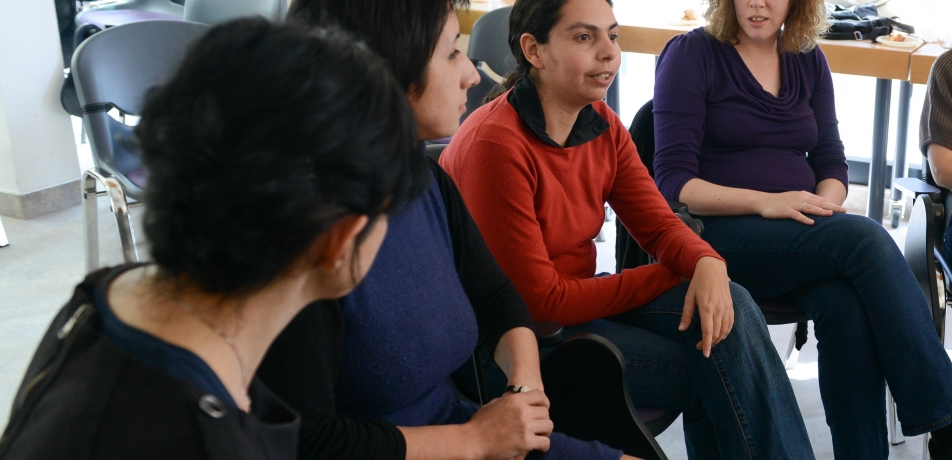Peer power for women postdocs
A new forum puts women's career issues in focus
People behind the science

When Susanne Pielawa arrived on campus in 2011 as a postdoctoral fellow in the Department of Condensed Matter Physics, she was fully aware she would be a minority as a woman in physics.
“This is the way it is for women in physics. It’s a very male-dominated field and even if a woman gets along perfectly well with her male colleagues, it can sometimes be lonely,” she says.
During her PhD studies at Harvard University, one of the motivators that kept her on track in pursuing a career in physics was her membership in two forums - a Women in Physics group and a Women in Science and Engineering group - where she networked with other female PhD students to discuss everything that was satisfying and challenging in their fields, hashing out ideas and trading advice.
Dr. Pielawa, who is German, decided to do her postdoc studies at the Weizmann Institute after hearing about the world-leading reputation of its physics faculty. “When I got here, I looked for a women-in-science group, but no such thing existed. I realized that what I experienced at Harvard was a very American invention and one that was worth duplicating here. So I created one.”
Susanne was inspired by the Weizmann Young PI Forum, which is overseen by Dr. Maya Schuldiner in the Department of Molecular Genetics and Dr. Ron Milo of the Department of Plant Sciences. The Young PI Forum conducts workshops and hosts guest speakers to talk about career issues, and otherwise supports young principal investigators (PIs). Susanne consulted with Prof. Varda Rotter, the former President’s Advisor for Advancing Women in Science and a member of the Department of Molecular Cell Biology; her successor, Prof. Daniella Goldfarb of the Department of Chemical Physics; and Prof. Lia Addadi, then Dean of the Feinberg Graduate School (FGS) and a member of the Department of Structural Biology. They were all highly supportive.
“The postdoc period is a critical one in the careers of any researcher, and for women perhaps even more so,” says Dr. Pielawa. “They must choose whether to take the path of an academic scientist, which is very demanding and competitive and, on top of that, they are weighing the possible effects that that decision has on their lives, as wives and mothers. This is a pivotal point for many women scientists and they need all the information and resources to help them make this decision. If they are going to take the academic path, encouragement, advice and support from their peers is essential.”
So a year ago, Dr. Pielawa launched the Women’s Postdoc Forum. The response was strong. The idea ignited interest among others, and women PhD students in chemistry have since started their own forum.
The forum meets every two weeks, and has had 21 meetings in which the participants are “coached” on a bevy of topics and have an opportunity to raise issues for discussion. Topics have included negotiation skills, self-confidence, and communication skills in the workplace. The group also has an online forum.
As a guest speaker, Prof. Addadi talked about balancing work and life. Prof. Uri Alon of the Department of Molecular Cell Biology ran a workshop on building a motivated research group - a topic he has written about in Cell Press. Dr. Schuldiner held a session on the “elevator pitch” - helping the women hone their messages about who they are and what their goals are, and feeling comfortable with self-promotion in the interest of advancing their careers.
Forum member Dr. Julia Khusnutdinova, who was a postdoc in the Department of Organic Chemistry and recently took a position as an adjunct professor at Okinawa Institute of Science and Technology in Japan, led a session on the job search process. “Graduate school and the postdoc period teach us how to be good researchers, but we don’t necessarily learn the ‘soft’ skills that we need to start our independent careers, like how to keep your group motivated or how to network at conferences,” she says.
“Meeting with Susanne and the postdoc forum she established was a revelation for me,” says Prof. Goldfarb. “The forum is so different than what I experienced during my career. With this forum, I have witnessed how important peer support and networking is for women who wish to pursue careers in science. After encouraging and seeing a chemistry PhD students’ forum come into being, I am now encouraging the creation of other similar forums on campus because they have tremendous value.”








